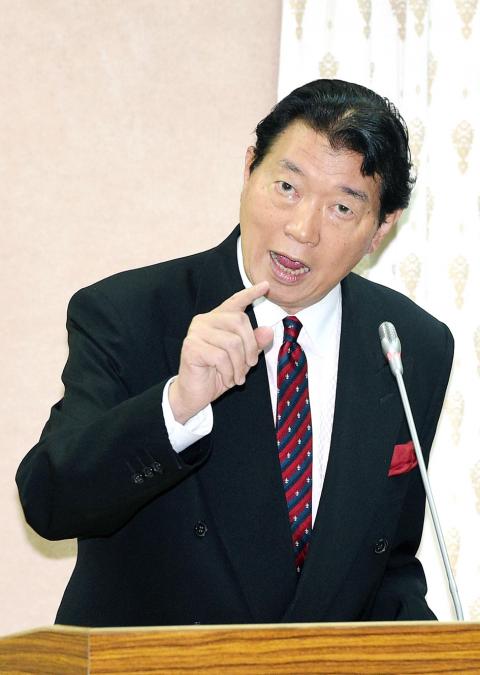Senior US government officials have made requests to President Ma Ying-jeou’s (馬英九) administration that the nation’s representative to the US Shen Lyu-shun (沈呂巡) be replaced over the controversial flag-raising ceremony at Twin Oaks Estate in Washington on Jan. 1, sources said.
Shen left Taipei for Washington yesterday, earlier than scheduled, to deal with the repercussions of the flag-raising event, sources said.
Sources said that US President Barack Obama’s administration would bypass Shen and discuss US-Taiwan business directly with the Ministry of Foreign Affairs and the National Security Council in Taipei.

Photo: Wang Min-wei, Taipei Times
The flag-raising ceremony and the conferment of medals and orders to uniformed military personnel serving in the US led by Shen has met with US reaction more severe than Shen expected.
He likely further provoked the US to make a clearer public response when he fielded questions from lawmakers earlier this week, by calling the unnamed US officials criticizing the flag-raising “nobody” and vowing to continue flying the flag on special occasions in future.
Sources said that after Shen publicly declared the New Year’s Day flag-raising ceremony as a major diplomatic breakthrough, and published a statement and pictures through the Taipei Economic and Cultural Representative Office (TECRO) in the US, the Obama administration made a seven-point statement on Monday morning disclaiming their knowledge or approval of the event.
The statement was announced by a senior official representing the Obama administration during an interview with the Liberty Times, the Taipei Times’ sister newspaper.
US Department of State spokeswoman Jen Psaki announced later the same day in a news briefing that the ceremony was “not consistent with US policy” and that the US did not know about the flag-raising in advance.
However, Shen fought back with harsh comments at the legislature, forcing the US to have the American Institute in Taiwan officially announce that Taiwan ensure that these kinds of things do not happen again, leaving no room for ambiguity for Shen or the Ma administration.
The public back-and-forths between the Taiwanese and US officials have now come to a temporary end, while closed-door negotiations continue.
Shen’s decision to fly the national flag has put the Ma administration in a bind. Since pan-blue supporters in the US and Taiwan lauded the act, replacing “patriotic ambassador” Shen would be denounced by supporters.
However, if Shen is snubbed by the Obama administration and unable to meet relevant US officials in the future, the office could be rendered obsolete, leaving Shen in a similar situation to former representative to the US Benjamin Lu (魯肇忠), who former US president Bill Clinton refused to interact with after his handling of former president Lee Teng-hui’s (李登輝) visit to the US in 1995.

Intelligence agents have recorded 510,000 instances of “controversial information” being spread online by the Chinese Communist Party (CCP) so far this year, the National Security Bureau (NSB) said in a report yesterday, as it warned of artificial intelligence (AI) being employed to generate destabilizing misinformation. The bureau submitted a written report to the Legislative Yuan in preparation for National Security Bureau Director-General Tsai Ming-yen’s (蔡明彥) appearance before the Foreign Affairs and National Defense Committee today. The CCP has been using cognitive warfare to divide Taiwanese society by commenting on controversial issues such as Taiwan Semiconductor Manufacturing Co’s (TSMC, 台積電) investments in the

HELPING HAND: The steering committee of the National Stabilization Fund is expected to hold a meeting to discuss how and when to utilize the fund to help buffer the sell-off The TAIEX plunged 2,065.87 points, or 9.7 percent, to close at 19,232.35 yesterday, the highest single-day percentage loss on record, as investors braced for US President Donald Trump’s tariffs after an extended holiday weekend. Amid the pessimistic atmosphere, 945 listed companies led by large-cap stocks — including Taiwan Semiconductor Manufacturing Co (TSMC, 台積電), Hon Hai Precision Industry Co (鴻海精密) and Largan Precision Co (大立光) — fell by the daily maximum of 10 percent at the close, Taiwan Stock Exchange data showed. The number of listed companies ending limit-down set a new record, the exchange said. The TAIEX plunged by daily maxiumu in just

‘COMPREHENSIVE PLAN’: Lin Chia-lung said that the government was ready to talk about a variety of issues, including investment in and purchases from the US The National Stabilization Fund (NSF) yesterday announced that it would step in to staunch stock market losses for the ninth time in the nation’s history. An NSF board meeting, originally scheduled for Monday next week, was moved to yesterday after stocks plummeted in the wake of US President Donald Trump’s announcement of 32 percent tariffs on Taiwan on Wednesday last week. Board members voted to support the stock market with the NT$500 billion (US$15.15 billion) fund, with injections of funds to begin as soon as today. The NSF in 2000 injected NT$120 billion to stabilize stocks, the most ever. The lowest amount it

NEGOTIATIONS: Taiwan has good relations with Washington and the outlook for the negotiations looks promising, Minister of Economic Affairs J.W. Kuo said Taiwan’s GDP growth this year is expected to decrease by 0.43 to 1.61 percentage points due to the effects of US tariffs, National Development Council (NDC) Minister Paul Liu (劉鏡清) said at a meeting of the legislature’s Economics Committee in Taipei yesterday, citing a preliminary estimate by a private research institution. Taiwan’s economy would be significantly affected by the 32 percent “reciprocal” tariffs slapped by the US, which took effect yesterday, Liu said, adding that GDP growth could fall below 3 percent and potentially even dip below 2 percent to 1.53 percent this year. The council has commissioned another institution